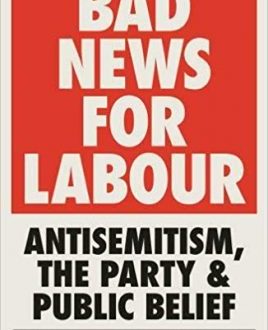This is a guest post by Michael Ezra
My post on the antisemitism of Karl Marx provoked much controversy. More than one person has told me to my face that I am “wrong” on the matter. In that case, I am in distinguished company.
Sir Isaiah Berlin was one of the greatest historians of ideas of the last century. He was unequivocal in his verdict on Marx and the Jewish question:
As for the Jews, in [“On the Jewish Question,” Marx] declared them to be a repellent symptom of the social malaise of the time, an excrescence upon the social body – not a race, or a nation, or even a religion to be saved by conversion to some other faith or way of life, but a collection of parasites, a gang of money-lenders rendered inevitable by the economically self-contradictory and unjust society that had generated them – to be eliminated as a group by the final solution to all social ills – the coming, inescapable, universal, social revolution. The violently anti-Semitic tone… became more and more characteristic of Marx in his later years… and is one of the most neurotic and revolting aspects of his masterful but vulgar personality.[1]
Likewise, biographer Robert Payne declared that Marx harboured a “deeply personal hatred” of Jews and displayed “virulent” antisemitism.[2] Another biographer, Saul Padover, argued that “Marx’s hatred of Jews was a canker which neither time nor experience ever eradicated from his soul.”[3]
The American sociologist Lewis Feuer’s edition of Marx became “the standard text used in American college classrooms to study Marxism for almost a generation.”[4] Feuer argued that Marx had “hysterical hatred of the Jews.”[5] The distinguished historian Walter Laqueur wrote that for Marx, Judaism was “a totally negative phenomenon.”[6] Seymour Martin Lipset, subsequent president of both the American Sociological Association and American Political Science Association, also defined Marx’s comments as “anti-Semitic.”[7]
In the socialist journal Dissent, Joseph Clark argued that “the association by Marx of Jews and huckstering, Jews and money-grubbing, Jews and loan-mongering, Jews and capital, has been a standard of all anti-Semitic propaganda.” He labelled Marx’s article “The Russian Loan” as “viciously anti-Semitic.”[8] A New York Times reviewer noted “dozens of anti-Semitic remarks” in Marx’s collected letters, which he found “disgusting.”[9]
These examples could be multiplied. Yet Robert Fine accuses all these commentators of being unable to comprehend what Marx was actually saying![10]
What of Marx’s other apologists?
David McLellan
Marx biographer David McLellan’s short defence seems rather confused:
It is largely [“On the Jewish Question”] that has given rise to the view that Marx was an anti-semite. It is true that a quick and unreflective reading of, particularly, the briefer second section leaves a nasty impression. It is also true that Marx indulged elsewhere in anti-Jewish remarks – though none as sustained as here.
So on the one hand, only a “quick and unreflective reading” leaves “a nasty impression,” but on the other hand the “anti-Jewish remarks” in this essay are “sustained.” McLellan adds that Marx “was himself attacked as a Jew by many of his most prominent opponents.” But how does this change the meaning of Marx’s own words?
McLellan argues that “On the Jewish Question” was not aimed at Jews as such but at “vulgar capitalism,” which was “popularly associated with Jews.” He continues: “the German word for Jewry – Judentum, – has the secondary sense of commerce and, to some extent, Marx played on this double meaning.” He adds that Marx’s friend Moses Hess used similar language.[11]
These excuses have not convinced the scholarly community. As John Maguire observed: “When Marx tells us that the ‘empirical essence’ of Judentum/Judaism is Judentum/commerce, there is every reason to believe that he means what he has said.”[12] Neil McInnes pointed out that on McLellan’s view, Marx was making the circular argument that “Western society became commercialised when it was commercialised.”[13] And Dennis Fischman warned: “If modern writers on Marx leave his scurrilous attacks on Judaism unanswered, then, they run the risk of helping to perpetuate them.”[14]
Hal Draper and Henry Pachter
Among Robert Fine’s sources is the American Marxist, Hal Draper, author of a famous 5-volume study of Marx’s theory of revolution.[15] Draper’s essay on Marx and the “Economic Jew Stereotype” rejected the antisemitism charge as anachronistic. The political historian Henry Pachter also insisted that “the term ‘anti-Semitic’ as we understand it today does not apply” – in spite of Marx’s “anti-Semitic expletives” and his use of “anti-Semitic invective” whenever it “served a propagandistic purpose”![16]
Even the anti-Zionist Joel Kovel dismissed these excuses:
Both Hal Draper and Henry Pachter make essentially the same point. Marx should not be judged by the standards of our day for using the common language of his… To excise anti-Semitism from Marx’s discourse because everybody else was saying the same thing… would simply erase all social science. Imagine making the same judgment on, say, Goebbels, who after all was only repeating what other Nazis said about Jews.[17]
Erich Fromm
According to the social psychologist Erich Fromm, it was “cold-war propaganda” to suggest that Marx was anti-Semitic. Conceding that Marx wrote “harsh” and “not always correct” things about Judaism, Fromm objected that “he said equally harsh words about the British shopkeepers, the German philosophers, and the Russians.”[18]
As Joseph Clark aptly commented:
Apart from the question whether racism applied to many nationalities is better than exclusive anti-Semitism, there is an astounding lack of symmetry that eludes Fromm. For it wasn’t the Jews of medieval times who drove the British out of their island kingdom; nor did the Jews exterminate the Germans; and the Russians were not deprived of their language, their culture, their national existence by the Jews.[19]
Abram Leon
In my previous article, I wrote that when “apologists for Marx’s antisemitism run out of explanations, they simply ignore his words.”[20] A case in point is the Trotsykist ideologue Abram Leon. In his tract The Jewish Question: A Marxist Interpretation,[21] Leon made use of a simple remedy for Marx’s statements that the Jew’s religion is “huckstering” and the Jew’s god is “Money.” He didn’t mention them.
Let me now turn to the serious research.
Julius Carlebach
The essential work on this subject is Julius Carlebach’s Karl Marx and the Radical Critique of Judaism.[22] Carlebach is an admirer of Marx (“a great man,” “a true genius,” “one of the greatest minds in the history of man”).[23] In his astonishingly detailed study, he nevertheless concludes:
Marx’s second essay on the Jewish question is cast in the same mould of those of Luther and Hitler. Like them, Marx knew little about Judaism and cared little for any empirical realities. Luther wanted to convert the Jews; Marx wanted to abolish them; Hitler wanted to expel and subsequently exterminate them. Marx is the logical and indispensable link between Luther and Hitler. He transmitted many of Luther’s ideas on the Jewish religion in secular form and underwrote many of the ideas which were eventually to find their way into Hitler’s conceptual system.[24]
So in a book that Professor Fine calls “wonderfully erudite,”[25] the very same essay that Professor Fine considers “witty” and “deeply ironic” is judged to be “anti-semitic” and an “indispensable link between Luther and Hitler”!
Edmund Silberner
“By far the most comprehensive and scholarly contribution,” according to Carlebach, was Edmund Silberner’s Sozialisten zur Judenfrage.[26] Silberner’s seminal chapter on Marx was originally published in English in 1949.[27] This essay adduces a wealth of evidence that Marx was a bigot whose “aversion to Jews was deeply rooted in his heart and mind.”[28] Silberner noted that Marx’s “Jewish self-hatred” led to repeated attacks on Jews as “a means of convincing himself and the outside the world how little Jewish he was, in spite of his rabbinical ancestors.”[29]
Symptomatic were not just his statements about Jews but also “what he did not say or do in their favour.” Although Marx felt “pity for the Rumanian people, oppressed by the Russians,” when he was informed that there had been a complaint of anti-Jewish persecutions in Moldavia, “he did not seem to react at all.” And “he remained silent when, from April to June 1881, a series of pogroms broke out in Russia.”[30]
As Silberner concluded:
If the pronouncements of Marx are not chosen at random, but are examined as a whole, and if, on the other hand, by anti-Semitism aversion to Jews is meant, Marx not only can but must be regarded as an outspoken anti-Semite.[31]
Thanks to Paul Bogdanor for editing this article and also thanks to the librarians at the Wiener Library, UCL Main Library, UCL Jewish Studies Library and the School of Slavonic and East European Studies Library for their assistance with numerous requests.
[1]Isaiah Berlin, The Life and Opinions of Moses Hess (W. Heffer, 1959), pp.17-18.
[2]Robert Payne, Marx, (W. H. Allen, 1968) pp.93-95.
[3]Saul K. Padover, Karl Marx: An Intimate Biography (McGraw-Hill, 1978) pp.17, 169; cited by Dennis Fischman, Political Discourse in Exile: Karl Marx and the Jewish Question (University of Massachusetts Press, 1991), p.7.
[4]Thomas Cushman and John Rodden, “Sociology and the Intellectual Life: An Interview with Lewis S. Feuer,” American Sociologist, Winter1997, p.58.
[5]Lewis S. Feuer, “Karl Marx and the Promethean Complex,” Encounter, December 1968, p.26.
[6]Walter Laqueur, “Zionism and the Marxist Critique of the left,” in Irving Howe and Carl Gershman (eds.) Israel, The Arabs & The Middle East (Bantam Books, 1972) p.18.
[7]Seymour Martin Lipset, “The Return of Anti-Semitism as a Political Force,” in ibid., p.419.
[8]Joseph Clark, “Marx and the Jews: Another View,” Dissent, September 1979.
[9]New York Times, December 6, 1979.
[10]Robert Fine, Karl Marx and the Radical Critique of Anti-Semitism, Engage Journal, May 2006.
[11]David McLellan, Karl Marx: A Biography (Macmillan, 1995) pp.76-77.
[12]John Maguire, Marx’s Paris Writings: An Analysis (Gill and Macmillan, 1972) p.30; cited by Julius Carlebach, Karl Marx and the Radical Critique of Judaism (Routledge, 1978), p.267.
[13]Neil McInnes, The Western Marxists (Alcove Press, 1972) pp.193, 227; cited by ibid.
[14]Fischman, op. cit., p.18.
[15]Hal Draper, Karl Marx’s Theory of Revolution, Vol.1: State and Bureaucracy (Monthly Review, 1977), pp.591-608.
[16]Henry Pachter, “Marx and the Jews,” Dissent, September 1979.
[17]Joel Kovel, “Marx on the Jewish Question,” Dialectical Anthropology, October 1983, pp. 35-36.
[18]Cited by Clark, op. cit, p.80.
[19]Ibid.
[20]Ezra, op. cit.
[21]Abram Leon, The Jewish Question: A Marxist Interpretation (Pathfinder Press, 1970).
[22]Carlebach, op. cit.
[23]Ibid., p.358.
[24]Ibid., p.352.
[25]Fine, op. cit.
[26]Carlebach, op. cit., p.447.
[27]Edmund Silberner, “Was Marx an Anti-Semite?” Historia Judaica, April 1949.
[28]Ibid., p.51.
[29]Ibid., p.14.
[30]Ibid., p.50.
[31]Ibid. (Emphasis in original).


